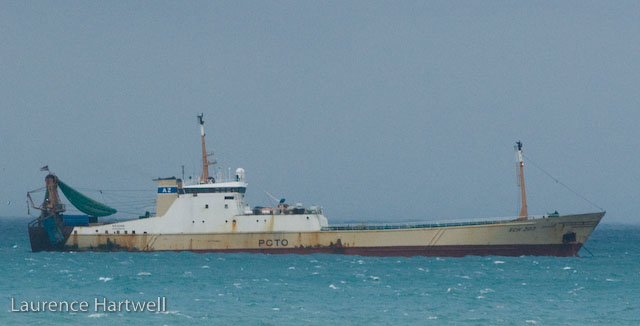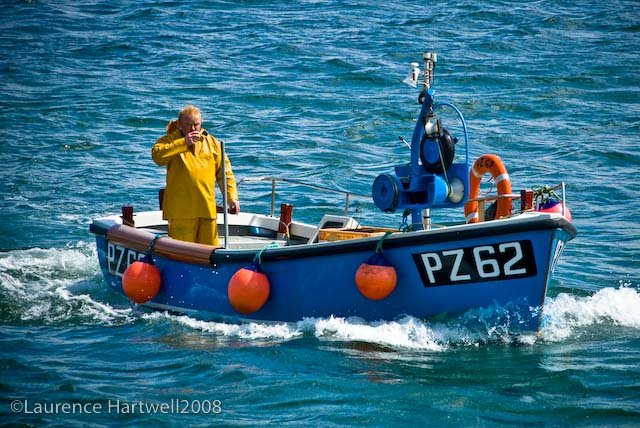Some things are just not what things seem.....
Sounds fantastic doesn't it - British fishermen now getting help from of all organisations Greenpeace!
This is what they say:
"Environmental pressure group says the government has awarded too great a share of the UK's fishing quota to less sustainable, industrial craft"
Seems fair enough. But this is a case of "lies, damned lies and statistics" to create a headline and emotive theme for a story and now a court case!
The figures they quote are as follows:
"Fishermen operating vessels under 10 meters long are only allocated four per cent of the UK’s fishing quota and six per cent of the English quota, whereas the five largest* foreign controlled vessels in England have 32 per cent."
What they don't say - because it doesn't suit the argument - is that the two quotas they give figures for are mainly for two entirely separate fish types. The first (6%) refers to mainly white fish species and the second (32%) refers to pelagic fish like mackerel and herring - it's a bit like comparing dairy farming milk quota with arable farmers potato quotas - the two are not related other than by common cause.
The five largest* vessels are huge pelagic trawlers like the one below...
 |
| Freezer trawler Ariadne |
all of which are what the 6% refers to as caught by the tiny (in comparison) inshore boats like the one above.
The NFFO goes one step further and in the article below outlines why Greenpeace's action may in fact have greater unintended consequences that are more damaging in the long run - though at least as they say turning the spotlight on the plight of the industry as a result of the CFP's flawed quota system and mis-mangemnt by the MMO failing to take into account the needs of very small fishing interests may turn out to have positive results!
From the NFFO:
"The National Federation of Fishermen’s Organisations (NFFO) has warned of potentially devastating effects policies outlined by Greenpeace could have on the availability, sustainability and price of fish should the NGO’s High Court action, announced this week, be successful.
The practical effect of following Greenpeace’s policies could leave much of the UK quota uncaught, undermining the nation's food security and putting the country’s national dish at risk. As a knock on effect of this, the proposed policies could also result in fish consumption becoming the exclusive preserve of the rich as prices at niche markets supplied by small-scale local fleets would be unaffordable to most British families.
The NFFO, which represents fishermen of all vessel sizes, has stated that whilst the proposed court action will help to shine a spotlight on the quota issue and help to bring clarity to an issue which has become bogged down in distortions and misinformation, the grounds for the case are delusional.
NFFO chief executive, Barrie Deas, said “So much nonsense has been spoken by Greenpeace on the issue of quota distribution and the sustainability of large and small-scale fishing that a court case which scrutinises the real issues can only be a good thing.
“As well as threatening the affordability of fish, greater allocations to the smaller inshore vessels could result in these waters becoming overfished as competition displaces vessels to previously sustainably fished areas. ‘Robbing Peter to pay Paul’ is simply not the answer.”
“Despite Greenpeace’s claims that they champion small boat fishermen, they have once again failed to think through the practical implications of what they are proposing. The UK’s need for a diverse fleet of large, medium and small vessels to take advantage of all its fishing opportunities is vital to the industry’s interdependence in supporting port infrastructures and ensuring continuation of supply.”
While there have been periodic acute shortages of quota in some under-10 metre fisheries, these resulted from a number of different factors, most of which were unrelated to the internal distribution of quota in the UK. The overall reduction in EU Total Allowable Catches since 1990 together with restrictive EU policies, for example towards skates and rays are among factors much more significant than the internal distribution of UK quota between small and larger vessels.
In recent years the NFFO has advanced a number of ways to address the underlying issues of quota shortages in the under 10 metre fleet. Championing more responsive management at EU level and by regional member states, providing high-catching under-10 metre vessels with more effective quota management systems equivalent to those already enjoyed by producer organisations and strengthening industry cooperation are just some examples of work being done by the NFFO and its members to safeguard the future of the UK’s diverse industry.
Deas continued: “All of this is a million miles away from Greenpeace's cynical toytown fantasy narrative of evil pantomime villain monster vessels. The under-10m fleet is a vitally important component of the UK fishing industry and it is of the utmost importance that it is put on a proper sustainable footing. This will not be achieved by Greenpeace’s distractions and grandstanding.
“There can be merit in using quota to encourage more sustainable ways of fishing. However, it is simply nonsense to say smaller vessels automatically fish more sustainably than large vessels. It all depends on the management regime and what the vessels are doing, not their size.
“Although there are always risks in going to court, we are confident Greenpeace's shallow and frankly erroneous claims will wither under the spotlight of High Court action. Greenpeace must have made the judgement that the publicity, even of failed court action will justify the costs. It is this deeply cynical tactical thinking that has characterised Greenpeace's intervention in fishing from the start.”
Source: Courtesy of the NFFO
